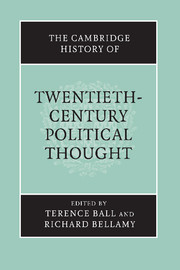Book contents
- Frontmatter
- Editors’ introduction
- Part I The changing fortunes of liberal democracy
- Part II Varieties of Marxism
- Part III Science, modernism and politics
- 15 Positivism: reactions and developments
- 16 Postmodernism: pathologies of modernity from Nietzsche to the post-structuralists
- 17 Weber, Durkheim and the sociology of the modern state
- 18 Freud and his followers
- 19 Modernism in art, literature and political theory
- 20 The new science of politics
- 21 Utilitarianism and beyond: contemporary analytical political theory
- Part IV New social movements and the politics of difference
- Part V Beyond Western political thought
- Biographies
- Bibliography
- Subject index
- Name index
- References
20 - The new science of politics
from Part III - Science, modernism and politics
Published online by Cambridge University Press: 28 March 2008
- Frontmatter
- Editors’ introduction
- Part I The changing fortunes of liberal democracy
- Part II Varieties of Marxism
- Part III Science, modernism and politics
- 15 Positivism: reactions and developments
- 16 Postmodernism: pathologies of modernity from Nietzsche to the post-structuralists
- 17 Weber, Durkheim and the sociology of the modern state
- 18 Freud and his followers
- 19 Modernism in art, literature and political theory
- 20 The new science of politics
- 21 Utilitarianism and beyond: contemporary analytical political theory
- Part IV New social movements and the politics of difference
- Part V Beyond Western political thought
- Biographies
- Bibliography
- Subject index
- Name index
- References
Summary
New ways to comprehend and control politics have been prophesied for the last half-millennium. Machiavelli blazed a ‘new route’ to traverse Renaissance statecraft. Hobbes constructed a new ‘civil science’ to pacify the revolutionary 1640s. Hume anticipated the novelty of the Enlightenment enterprise ‘to reduce politics to a science’. Adams conjured a ‘divine science of politics’ to consecrate a constitutional order without precedent. Hamilton heralded the ‘vast improvements’ and ‘wholly new discoveries’ in ‘the science of politics’ for post-revolutionary republics. Tocqueville foresaw ‘a new political science … for a world itself quite new’. The pattern continues into the third millennium, marking more than a century since the academic discipline of political science emerged in the 1880s. A ‘new science of politics’ was anticipated in the 1920s and 1930s, and was followed by a ‘behavioural revolution’ in the 1950s and 1960s. The conceptions of science backing these anticipatory ‘new’ schemes varied considerably, as did the political contexts within which they developed and the political projects to which they contributed.
The twentieth-century chapter in the venerable new science of politics is best understood, in its political dimensions, as a species of democratic theory, marked by increasingly technical methods and a healthy dose of realism about power, propaganda and public opinion. It is less famous than those grand ‘isms’ that have dominated twentieth-century political thought. But it intersects them, especially modernism, positivism, liberalism, socialism and fascism.
- Type
- Chapter
- Information
- The Cambridge History of Twentieth-Century Political Thought , pp. 431 - 445Publisher: Cambridge University PressPrint publication year: 2003
References
- 1
- Cited by

